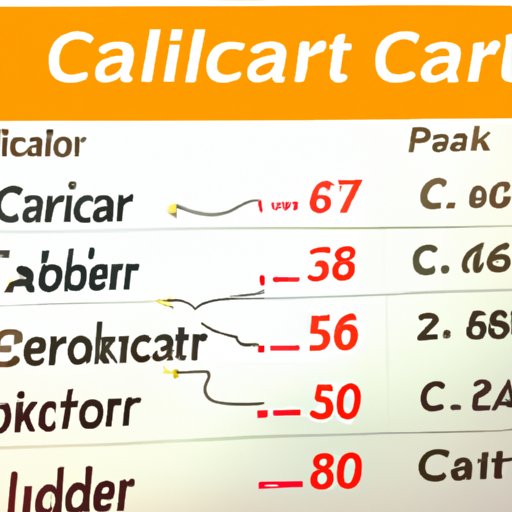Introduction
A calorie deficit is a state where you are burning more calories than you are consuming. Eating in a calorie deficit can be an effective way to lose weight. When done correctly, eating in a calorie deficit can also benefit overall health, as it can reduce the risk of chronic diseases such as heart disease, stroke, and diabetes.
Track Your Calories
Tracking your daily food intake is key to achieving a calorie deficit. Logging what you eat throughout the day will help you better understand your dietary habits and uncover any potential issues that may be preventing you from losing weight. Knowing exactly how many calories you’re consuming can help you make smarter decisions about what to eat and when to eat it.
When tracking your calories, it’s important to be honest with yourself. Don’t underestimate or overestimate how much you’ve eaten—accurate logging is essential for successful weight loss. In addition, try to record your meals as soon as possible after you’ve finished eating. This will help you remember all the details of what you ate and make it easier to track your progress.
Eat More Protein
Increasing your protein intake is one of the best ways to achieve a calorie deficit. Protein is an important macronutrient that helps build muscle, regulate hormones, and keep you feeling fuller for longer. Studies have shown that high-protein diets can lead to greater fat loss compared to other diets.
Good sources of quality protein include lean meats such as chicken, fish, and turkey; eggs; dairy products such as yogurt and cottage cheese; and plant-based proteins like beans, lentils, and quinoa. For optimal results, aim to get at least 20-30% of your daily calorie intake from protein.
Cut Back On Processed Foods
Processed foods are often high in calories and low in nutrients, so cutting back on these types of foods is essential for weight loss. Instead, focus on eating whole, unprocessed foods that are rich in vitamins, minerals, and fiber. Whole foods are not only more nutritious, but they can also help you feel fuller for longer, which can aid in calorie deficit.
Examples of healthy whole foods include fruits and vegetables, nuts and seeds, whole grains, legumes, and lean proteins. These foods provide your body with the nutrients it needs to function properly and can help you reach your weight loss goals.
Increase Fiber Intake
High-fiber foods are an important part of any diet, especially when trying to eat in a calorie deficit. Fiber helps keep you full and can help reduce cravings for unhealthy foods. It can also help slow down digestion, which helps regulate blood sugar levels and prevent spikes in hunger.
Good sources of dietary fiber include fruits and vegetables, legumes, nuts and seeds, and whole grains. Aim to get at least 25-35 grams of fiber per day for optimal results.
Get Enough Sleep
Getting enough quality sleep is essential for weight loss. Poor sleep can disrupt hormones that control appetite and lead to overeating. Studies have found that people who don’t get enough sleep tend to consume more calories than those who do.
To ensure you’re getting enough restful sleep, stick to a consistent sleep schedule, limit caffeine and alcohol consumption, and avoid screens before bed. Additionally, try to incorporate relaxation techniques such as yoga and meditation into your nightly routine.
Exercise Regularly
Regular exercise can help boost metabolism and burn extra calories, making it an important part of any weight loss plan. Aim to get at least 30 minutes of moderate-intensity exercise five days a week for optimal results. Examples of exercises that can help you achieve a calorie deficit include walking, running, biking, swimming, and strength training.
Conclusion
Eating in a calorie deficit can be an effective way to lose weight when done correctly. To achieve a calorie deficit, track your calories, increase your protein intake, cut back on processed foods, increase your fiber intake, get enough sleep, and exercise regularly. With dedication and consistency, you can successfully reach your weight loss goals.
(Note: Is this article not meeting your expectations? Do you have knowledge or insights to share? Unlock new opportunities and expand your reach by joining our authors team. Click Registration to join us and share your expertise with our readers.)
